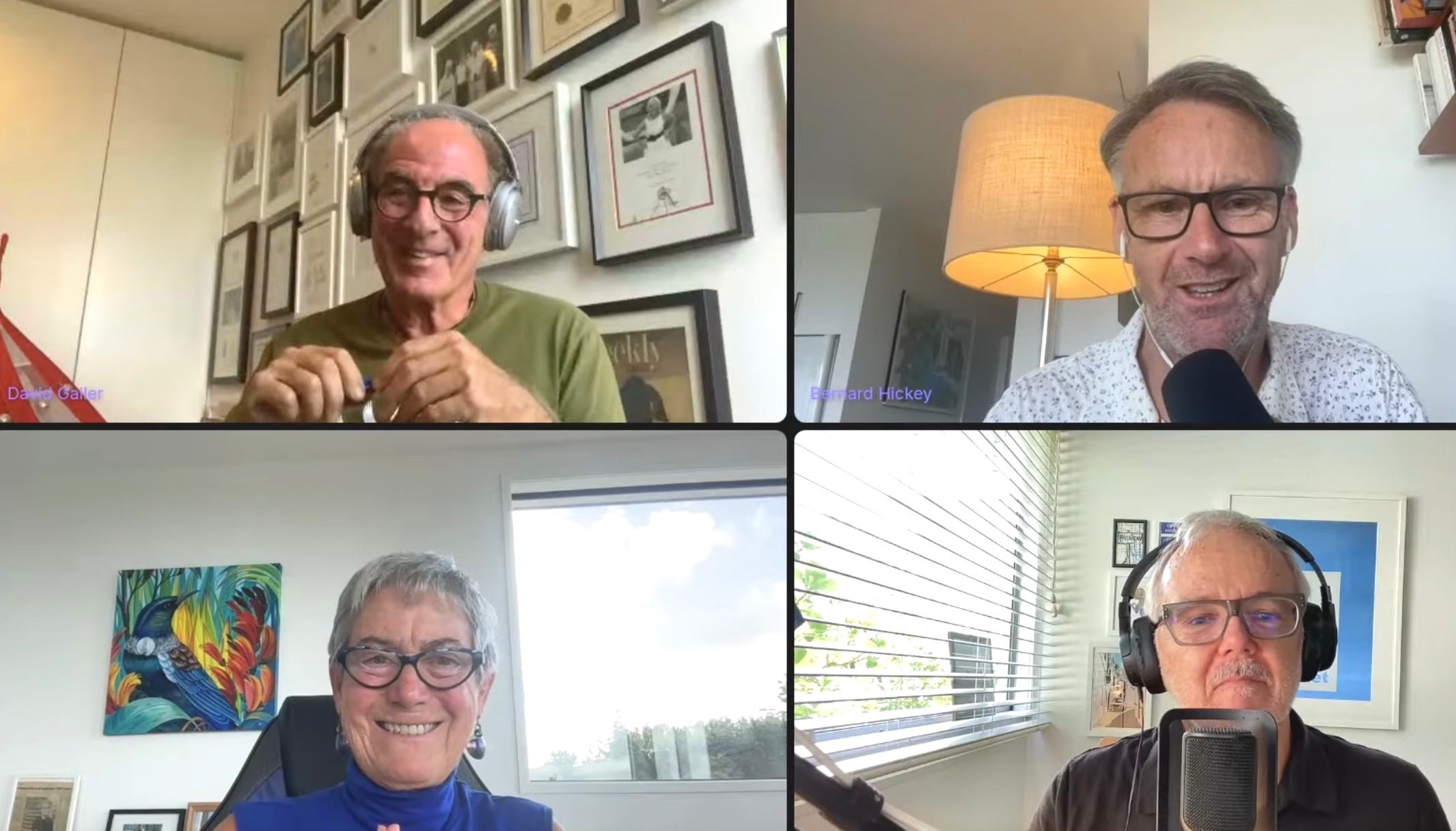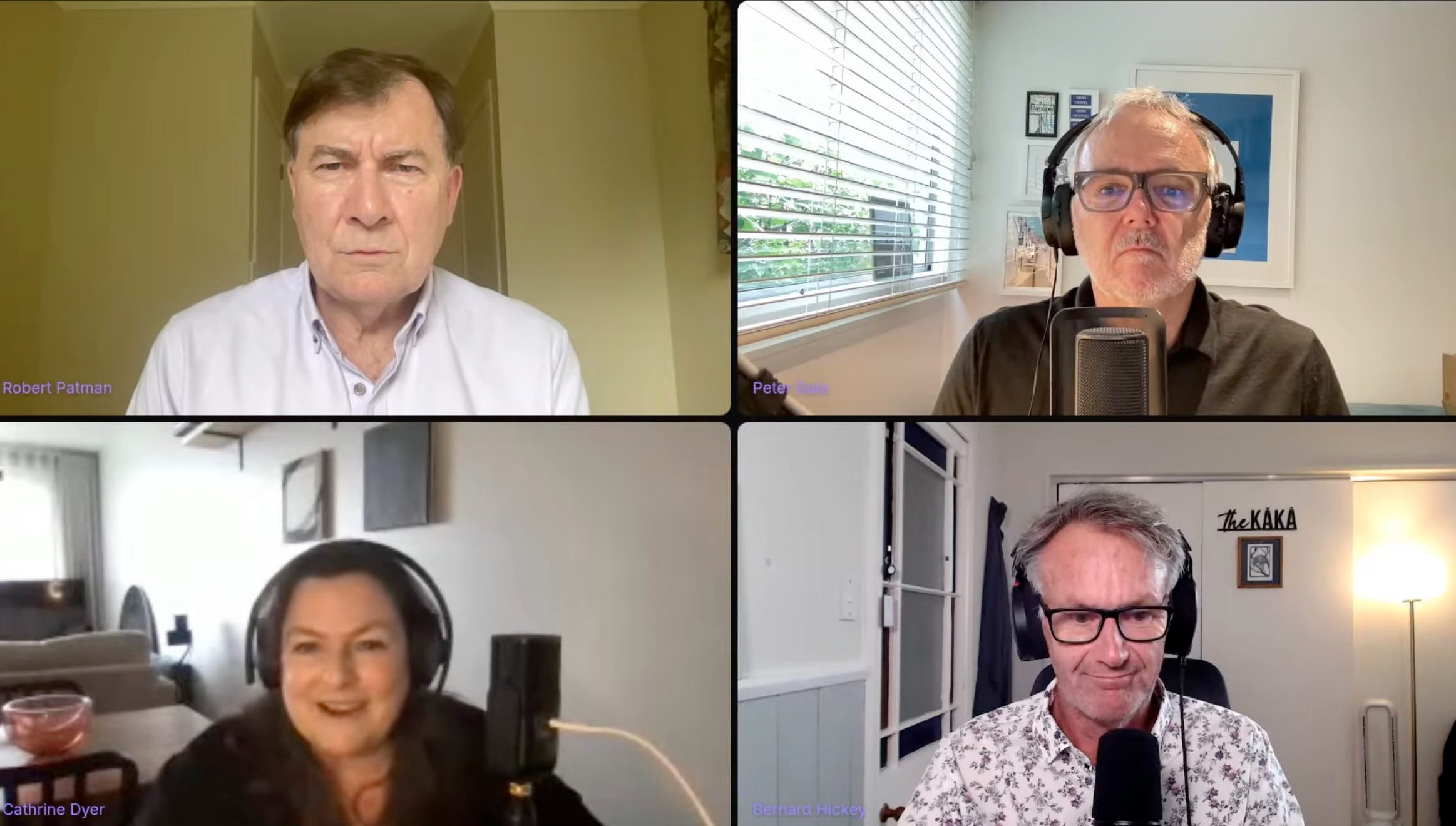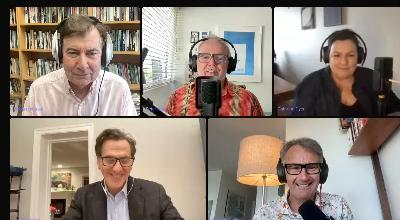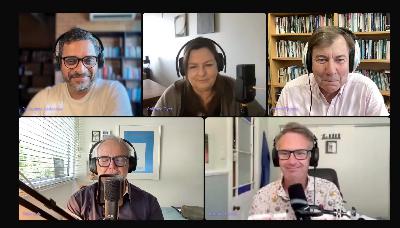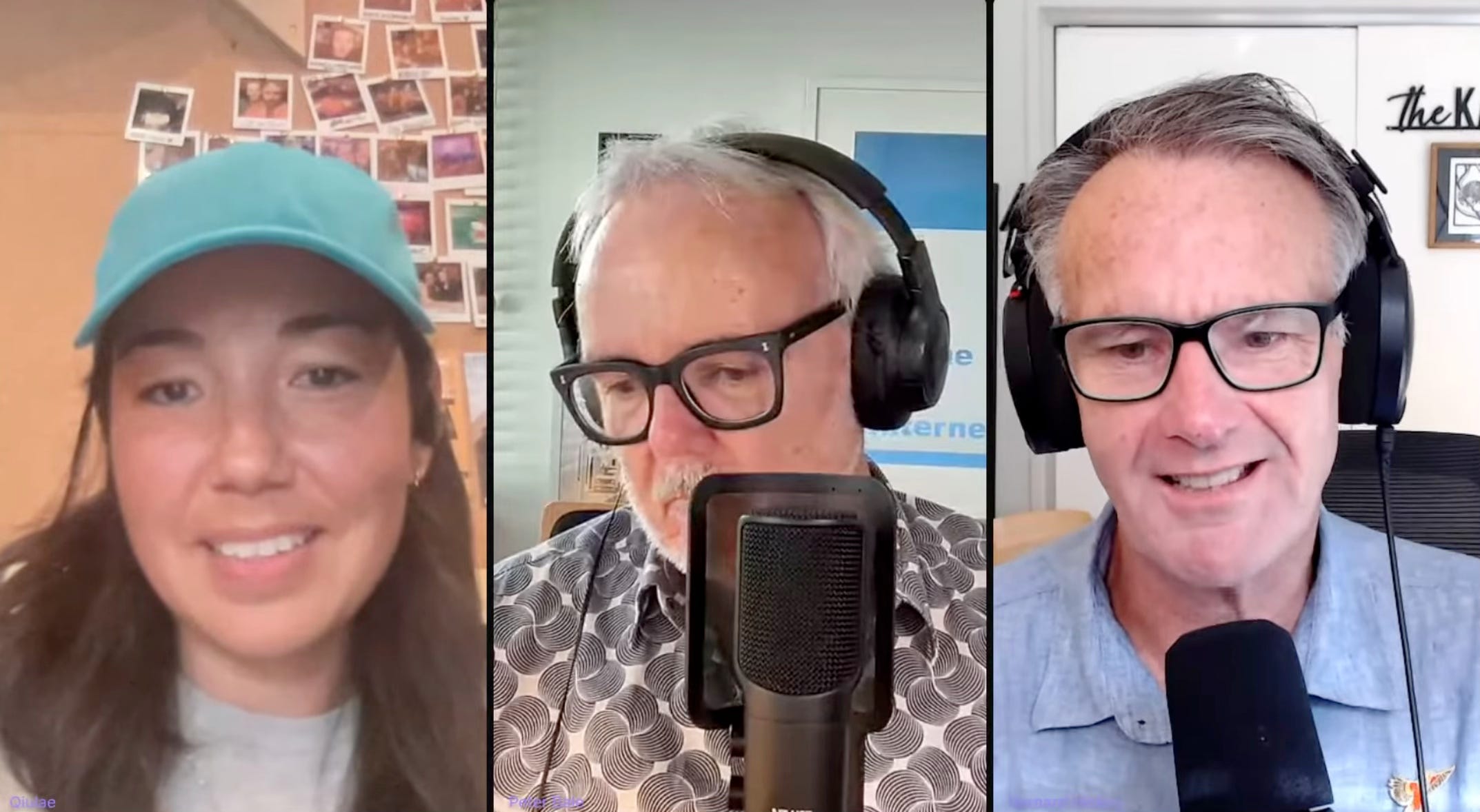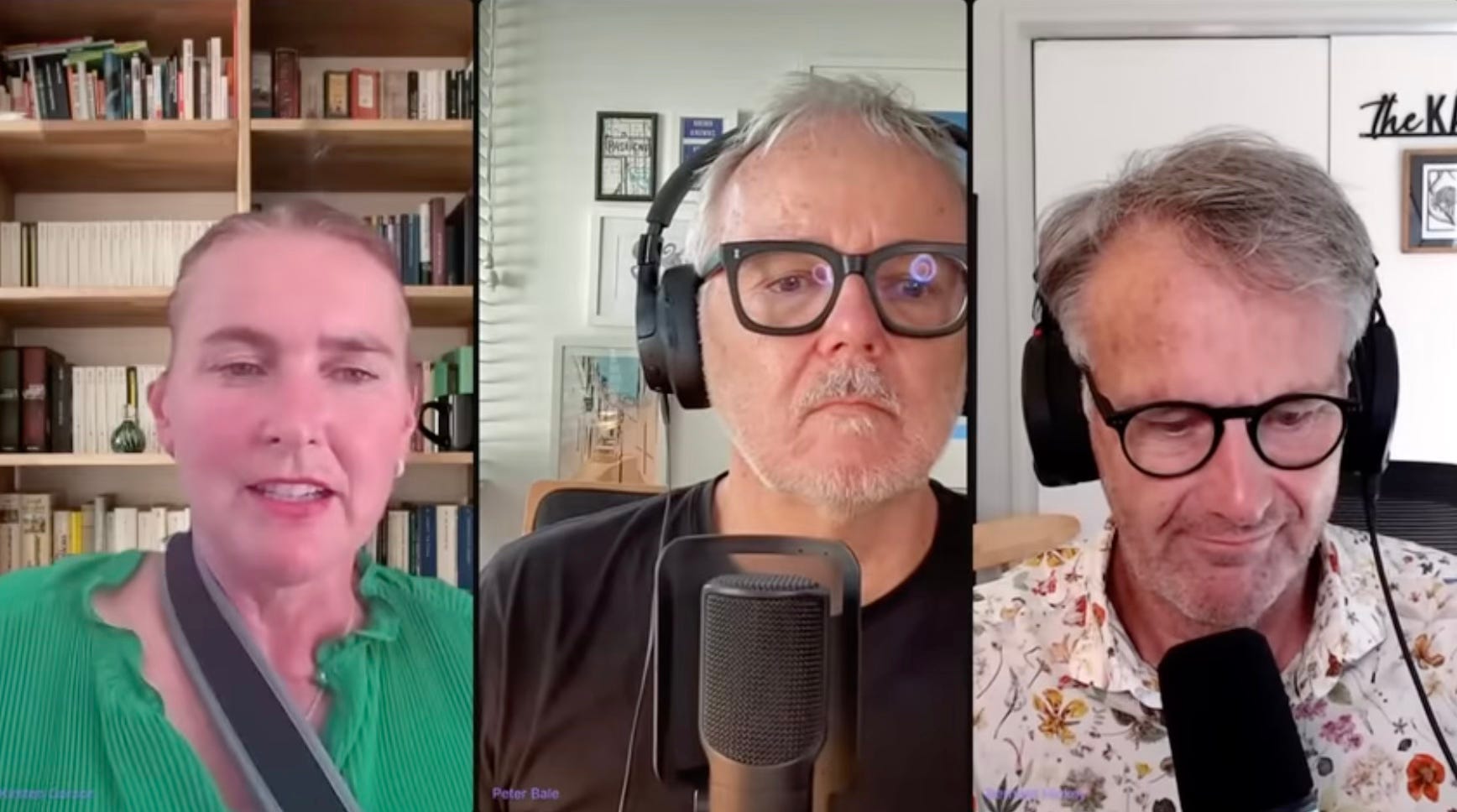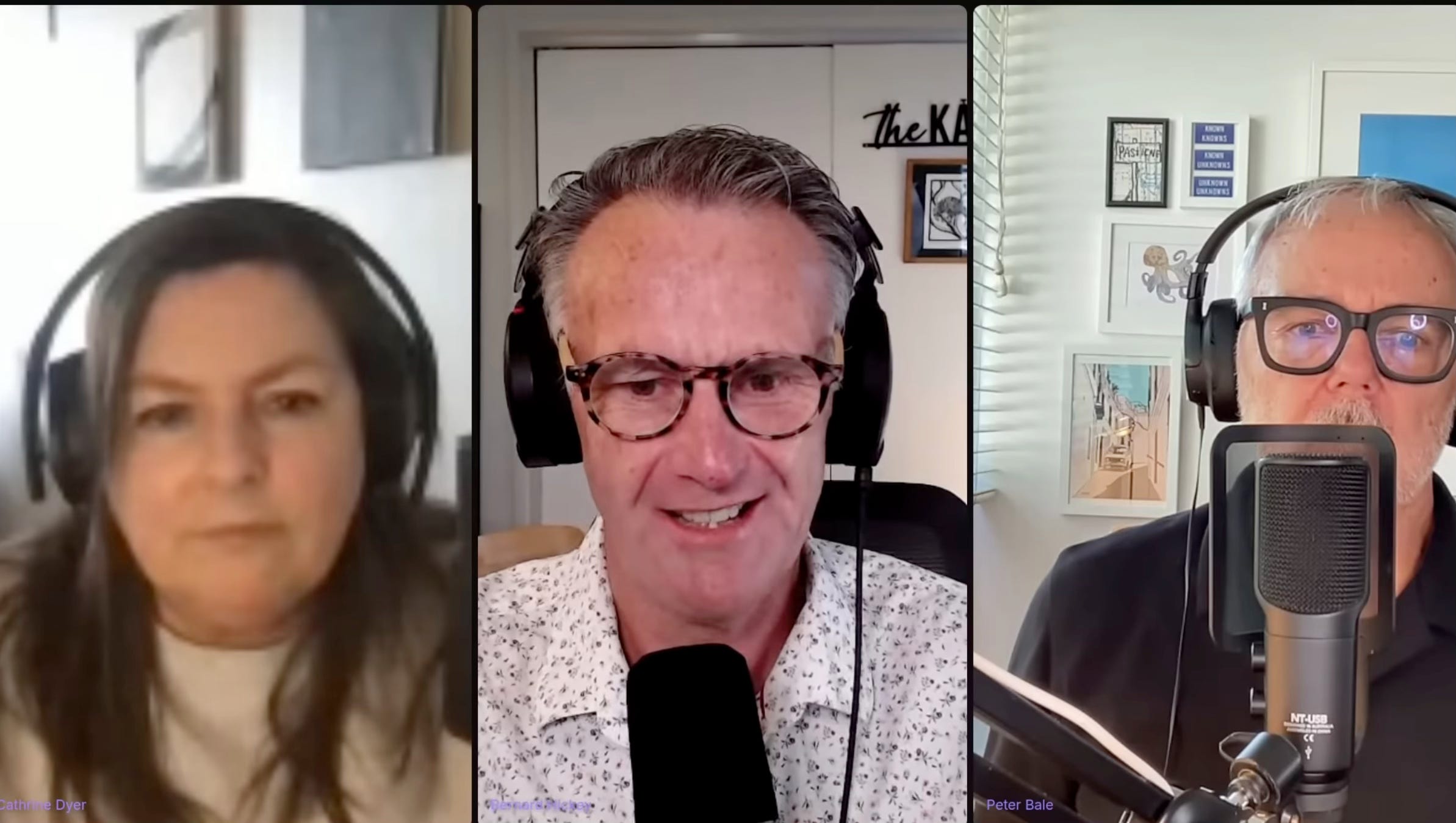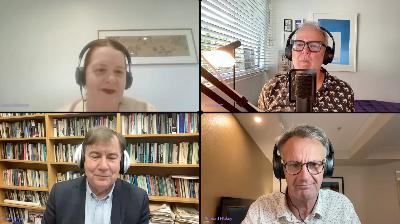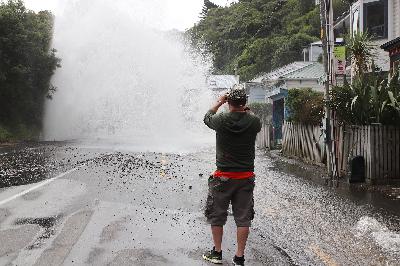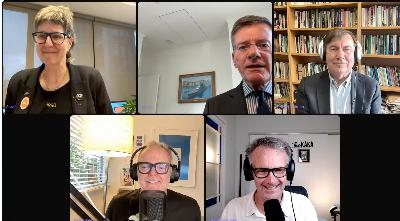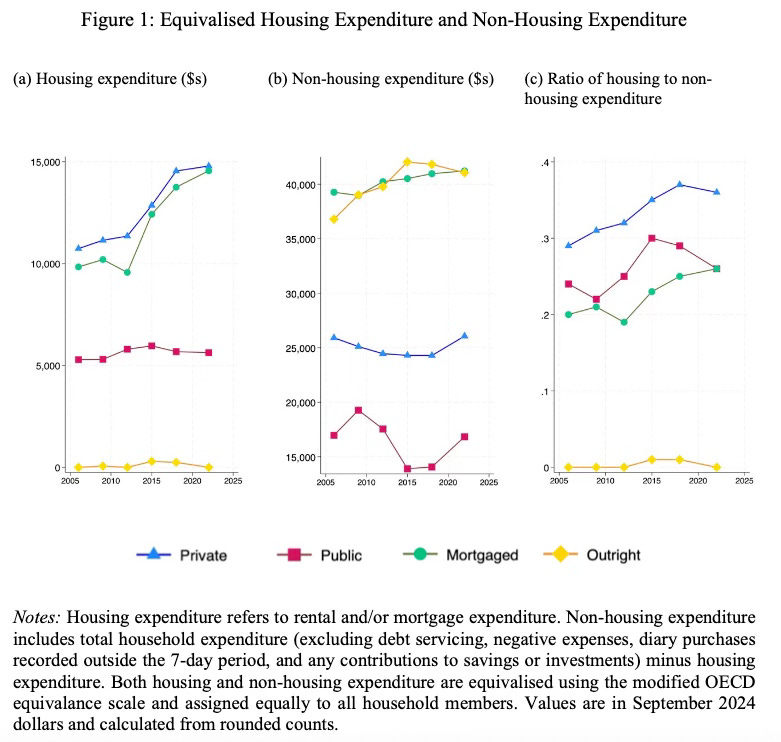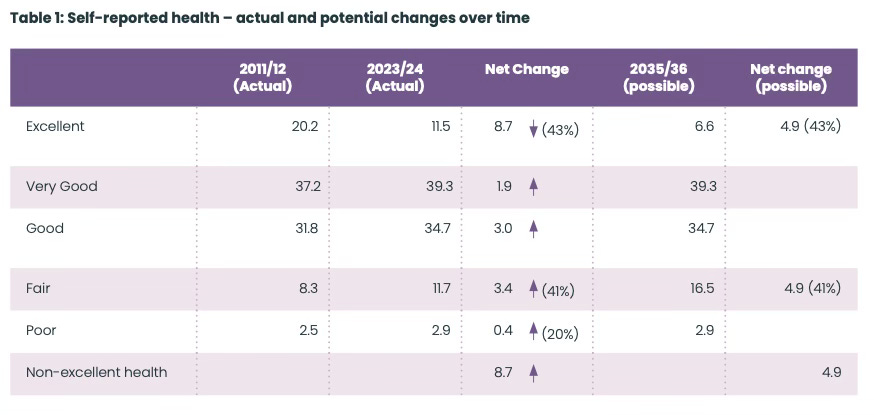Discover The Hoon
The Hoon

The Hoon
Author: Bernard Hickey
Subscribed: 33Played: 1,399Subscribe
Share
© Bernard Hickey
Description
Bernard Hickey's discussions with Peter Bale and guests about the political economy in Aotearoa-NZ and in geo-politics, including issues around housing affordability, climate change inaction and child poverty reduction.
thekaka.substack.com
thekaka.substack.com
185 Episodes
Reverse
The podcast above of the weekly ‘Hoon’ webinar for paying subscribers on Thursday night featured co-hosts Bernard Hickey & Peter Bale talking with regular guests Cathrine Dyer and Robert Patman, along with special guest David Farrar, talking about his Op-Ed in the The Post-$ arguing it’s time New Zealand became the seventh state of Australia.We talked about:* The water treatment plant problems in Christchurch and Wellington;* The gutting of the Washington Post’s newsroom;* The effects of climate change on biodiversity, including the deaths of dugongs in Thailand, the deaths of bats in Western Australia, the freezing of iguanas in Florida;* Insurance retreat in New Zealand; and,* Rare earth minerals and a possible deal between New Zealand and the US;The Hoon’s podcast version above was recorded on Thursday night during a live webinar for over 200 paying subscribers and was produced and edited by Simon Josey. The Hoon won the silver award for best current affairs podcast in last year’s New Zealand Podcast awards. (This is a sampler for all free subscribers and anyone else who stumbles on it. Thanks to the support of paying subscribers here, we’re able to spread my public interest journalism here about housing affordability, climate change and poverty reduction other public venues. Join the community supporting and contributing to this work with your ideas, feedback and comments, and by subscribing in full. Remember, all students and teachers who sign up for the free version with their .ac.nz and .school.nz email accounts are automatically upgraded to the paid version for free. Also, here’s a couple of special offers: $3/month or $30/year for under 30s & $6.50/month or $65/year for over 65s who rent.)Ngā mihi nui.Bernard This is a public episode. If you'd like to discuss this with other subscribers or get access to bonus episodes, visit thekaka.substack.com/subscribe
The podcast above of the weekly ‘Hoon’ webinar for paying subscribers on Thursday night featured co-hosts Bernard Hickey & Peter Bale talking with regular guests Cathrine Dyer and Robert Patman, along with special guest historian and author Jonathan Lyons.We talked about:* Likely issues in Election 2026 due on November 7, including anti-migration comments from Winston Peters and his comments backing Donald Trump on withdrawing from the World Health Organisation;* The dramas this week in Global Financial Markets around the reserve currency status of the US dollar and another stalling in the New Zealand economy;* The fallout from this month’s extraordinary weather events made worse by unaddressed climate change, and some solutions, including this EECA report on shifting power demand off-peak and this Manu Caddie post;* Donald Trump’s latest threats to attack Iran, along with the history of revolutions in Iran and the situation there now, including Jonathan and Robert. Jonathan has written these books on Iran: The House of Wisdom: How the Arabs Transformed Western Civilization, and, Islam Through Western Eyes: From the Crusades to the War on Terrorism.The Hoon’s podcast version above was recorded on Thursday night during a live webinar for over 200 paying subscribers and was produced and edited by Simon Josey. The Hoon won the silver award for best current affairs podcast in last year’s New Zealand Podcast awards. (This is a sampler for all free subscribers and anyone else who stumbles on it. Thanks to the support of paying subscribers here, we’re able to spread my public interest journalism here about housing affordability, climate change and poverty reduction other public venues. Join the community supporting and contributing to this work with your ideas, feedback and comments, and by subscribing in full. Remember, all students and teachers who sign up for the free version with their .ac.nz and .school.nz email accounts are automatically upgraded to the paid version for free. Also, here’s a couple of special offers: $3/month or $30/year for under 30s & $6.50/month or $65/year for over 65s who rent.)Ngā mihi nui.Bernard This is a public episode. If you'd like to discuss this with other subscribers or get access to bonus episodes, visit thekaka.substack.com/subscribe
The podcast above of the weekly ‘Hoon’ webinar for paying subscribers on Thursday night featured co-hosts Bernard Hickey & Peter Bale talking with regular guests Cathrine Dyer and Robert Patman, along with special guests Auckland University Emeritus Professor Jane Kelsey and intensive care specialist Dr David Galler.We talked about:* Likely issues in Election 2026 due on November 7, including anti-migration comments from Shane Jones in the wake of protests against rockpool harvesting (RNZ) and the economy’s struggle to generate growth most can feel;* This week’s extraordinary weather events made worse by unaddressed climate change, including this new UK paper on the environment and national security and the measures that should be taken to make Aotearoa more resilient;* Trump’s latest rupturing of the global world order, including Mark Carney’s speech at Davos and Donald Trump’s latest threats to invade Greenland;* How New Zealand adapts to the law of the jungle; and,* What’s happening in our health system, and how to improve it, including discussions about this Andrea Black paper, this Deloitte paper and the launch this week of Kaitiaki Hauora, which is a national coalition of workers, iwi, union, and advocacy groups wanting to strengthen public health that includes David Galler.Jane Kelsey has written these pieces for The Conversation on geopolitics so far this year:* Trump is threatening more tariffs over access to critical minerals – will NZ be targeted?* The World Trade Organization is on life support. Will Trump’s new rules finish it off?Robert Patman has written this piece for The Conversation this year: * As Trump rewrites the rules in Venezuela, NZ faces a foreign policy reckoningThe Hoon’s podcast version above was recorded on Thursday night during a live webinar for over 200 paying subscribers and was produced and edited by Simon Josey. The Hoon won the silver award for best current affairs podcast in last year’s New Zealand Podcast awards. (This is a sampler for all free subscribers and anyone else who stumbles on it. Thanks to the support of paying subscribers here, we’re able to spread my public interest journalism here about housing affordability, climate change and poverty reduction other public venues. Join the community supporting and contributing to this work with your ideas, feedback and comments, and by subscribing in full. Remember, all students and teachers who sign up for the free version with their .ac.nz and .school.nz email accounts are automatically upgraded to the paid version for free. Also, here’s a couple of special offers: $3/month or $30/year for under 30s & $6.50/month or $65/year for over 65s who rent.)Ngā mihi nui.Bernard This is a public episode. If you'd like to discuss this with other subscribers or get access to bonus episodes, visit thekaka.substack.com/subscribe
The podcast above of the weekly ‘Hoon’ webinar for paying subscribers on Thursday night featured co-hosts Bernard Hickey & Peter Bale talking with regular guests Cathrine Dyer and Robert Patman.We talked about:* US President Donald Trump’s attack on the US Federal Reserve’s independence and why it matters to us;* RBNZ Governor Anna Breman’s defence of the Fed’s independence;* NZ First Leader and Foreign Minister Winston Peters’ criticism of Breman, despite his votes in favour of central bank independence over the years;* How Trump’s strike on Venezuela is upending ever more global norms;* record-high sea temperatures and how climate change is already a major part of the affordability story; and,* a rocky election year ahead of misinformation in the absence of 3News, Sunday, Fair Go and a larger number of climate journalists.The Hoon’s podcast version above was recorded on Thursday night during a live webinar for over 200 paying subscribers and was produced and edited by Simon Josey. The Hoon won the silver award for best current affairs podcast in last year’s New Zealand Podcast awards. (This is a sampler for all free subscribers and anyone else who stumbles on it. Thanks to the support of paying subscribers here, we’re able to spread my public interest journalism here about housing affordability, climate change and poverty reduction other public venues. Join the community supporting and contributing to this work with your ideas, feedback and comments, and by subscribing in full. Remember, all students and teachers who sign up for the free version with their .ac.nz and .school.nz email accounts are automatically upgraded to the paid version for free. Also, here’s a couple of special offers: $3/month or $30/year for under 30s & $6.50/month or $65/year for over 65s who rent.)Ngā mihi nui.Bernard This is a public episode. If you'd like to discuss this with other subscribers or get access to bonus episodes, visit thekaka.substack.com/subscribe
The podcast above of the weekly ‘Hoon’ webinar for paying subscribers on Thursday night featured co-hosts Bernard Hickey & Peter Bale talking with regular guests Cathrine Dyer and Robert Patman.Our special guests this week were Philippa Yasbek, who heads Gun Control NZ and Doyen: NZ Jews Against Occupation, and Lee Feinstein, former US ambassador to Warsaw and senior diplomat under Democratic administrations, Dean of the Hamilton Lugar School of Global and International Studies at Indiana University Bloomington, long-serving board member of the United States Holocaust Memorial Museum.The Hoon’s podcast version above was recorded on Thursday night during a live webinar for over 200 paying subscribers and was produced and edited by Simon Josey. The Hoon won the silver award for best current affairs podcast in last year’s New Zealand Podcast awards. (This is a sampler for all free subscribers and anyone else who stumbles on it. Thanks to the support of paying subscribers here, we’re able to spread my public interest journalism here about housing affordability, climate change and poverty reduction other public venues. Join the community supporting and contributing to this work with your ideas, feedback and comments, and by subscribing in full. Remember, all students and teachers who sign up for the free version with their .ac.nz and .school.nz email accounts are automatically upgraded to the paid version for free. Also, here’s a couple of special offers: $3/month or $30/year for under 30s & $6.50/month or $65/year for over 65s who rent.)Ngā mihi nui.Bernard This is a public episode. If you'd like to discuss this with other subscribers or get access to bonus episodes, visit thekaka.substack.com/subscribe
The podcast above of the weekly ‘Hoon’ webinar for paying subscribers on Thursday night featured co-hosts Bernard Hickey & Peter Bale talking with regular guests Cathrine Dyer and Robert Patman and special guest Sanjana Hottotuwa about the importance and meaning of Donald Trump’s new US National Security Strategy document for Aotearoa and the world.The Hoon’s podcast version above was recorded on Thursday night during a live webinar for over 200 paying subscribers and was produced and edited by Simon Josey. The Hoon won the silver award for best current affairs podcast in last year’s New Zealand Podcast awards. (This is a sampler for all free subscribers and anyone else who stumbles on it. Thanks to the support of paying subscribers here, we’re able to spread my public interest journalism here about housing affordability, climate change and poverty reduction other public venues. Join the community supporting and contributing to this work with your ideas, feedback and comments, and by subscribing in full. Remember, all students and teachers who sign up for the free version with their .ac.nz and .school.nz email accounts are automatically upgraded to the paid version for free. Also, here’s a couple of special offers: $3/month or $30/year for under 30s & $6.50/month or $65/year for over 65s who rent.)Ngā mihi nui.BernardPS: Here’s a cookie recipe Peter recommends. Apropos of some good news. This is a public episode. If you'd like to discuss this with other subscribers or get access to bonus episodes, visit thekaka.substack.com/subscribe
The podcast above of the weekly ‘Hoon’ webinar for paying subscribers on Thursday night featured Bernard Hickey talking with regular guest Cathrine Dyer and special guest Lawyers for Climate Change Executive Director Jessica Palairet about this weeks news on climate change. Bernard also talked with tax policy expert and accountant Terry Baucher about the IRD’s announcement yesterday it wants to tax company loans to shareholders as dividends if they’re not repaid within a year. As of March 31, 2024, 119,000 companies are owed $28 billion by 165,000 shareholders. Terry has a podcast on Interest.co.nz.The Hoon’s podcast version above was recorded on Thursday night during a live webinar for over 200 paying subscribers and was produced and edited by Simon Josey. The Hoon won the silver award for best current affairs podcast in last year’s New Zealand Podcast awards. (This is a sampler for all free subscribers and anyone else who stumbles on it. Thanks to the support of paying subscribers here, we’re able to spread my public interest journalism here about housing affordability, climate change and poverty reduction other public venues. Join the community supporting and contributing to this work with your ideas, feedback and comments, and by subscribing in full. Remember, all students and teachers who sign up for the free version with their .ac.nz and .school.nz email accounts are automatically upgraded to the paid version for free. Also, here’s a couple of special offers: $3/month or $30/year for under 30s & $6.50/month or $65/year for over 65s who rent.)Ngā mihi nui.Bernard This is a public episode. If you'd like to discuss this with other subscribers or get access to bonus episodes, visit thekaka.substack.com/subscribe
The podcast above of the weekly ‘Hoon’ webinar for paying subscribers on Thursday night featured co-hosts Bernard Hickey and Peter Bale talking with regular guests Cathrine Dyer and Robert Patman and a special guest about the economy, politics, geopolitics and climate change.This week’s special guest was new leader of The Opportunity Party, Quilae Wong.This week:* Bernard and Peter talked with Quilae ‘Q’ Wong about The Opportunity Party’s name change, her background, her ambitions, the party’s land tax policy, the ‘Abundance’ agenda and the issue of wasted votes.* Bernard and Peter talked with Robert about Donald Trump and Vladimir Putin’s latest attempt to railroad Ukraine into a capitulation, along with Europe’s reaction.* Bernard and Peter talked with Cathrine about New Zealand giving up on phasing out fossil fuels (Marc Daalder’s piece in Newsroom), the abandonment of a big carbon capture scheme ( Kate Newton’s piece for RNZ), and Kirsty Johnston’s deep-dive for RNZ about the oil and gas industry capturing the Government’s climate policies.* Bernard talked about the RBNZ’s rate cut and the economy’s outlook, along with the tragic loss of the first contributory pension scheme in 1975.The Hoon’s podcast version above was recorded on Thursday night during a live webinar for over 200 paying subscribers and was produced and edited by Simon Josey. The Hoon won the silver award for best current affairs podcast in last year’s New Zealand Podcast awards. (This is a sampler for all free subscribers and anyone else who stumbles on it. Thanks to the support of paying subscribers here, we’re able to spread my public interest journalism here about housing affordability, climate change and poverty reduction other public venues. Join the community supporting and contributing to this work with your ideas, feedback and comments, and by subscribing in full. Remember, all students and teachers who sign up for the free version with their .ac.nz and .school.nz email accounts are automatically upgraded to the paid version for free. Also, here’s a couple of special offers: $3/month or $30/year for under 30s & $6.50/month or $65/year for over 65s who rent.)Ngā mihi nui.Bernard This is a public episode. If you'd like to discuss this with other subscribers or get access to bonus episodes, visit thekaka.substack.com/subscribe
The podcast above of the weekly ‘Hoon’ webinar for paying subscribers on Thursday night featured co-hosts Bernard Hickey and Peter Bale talking with regular guests Cathrine Dyer and Robert Patman and a special guest about the economy, politics, geopolitics and climate change.This week’s special guest was Drive Electric Chair Kirsten Corson.This week:* Bernard and Peter talked about Peter’s work on a CEO profile special series of articles for BusinessDesk-$, including that Brian Roche’s favourite book was by Jo Nesbo.* Bernard, Peter and Cathrine talked about the Government’s decision this week to slash penalties for importing high emissions vehicles to save buyers of double-cab utes hundreds of dollars.* Peter and Robert talked about Donald Trump’s attacks on the rules of international law, referring to this article by Philippe Sands in The Guardian. They also talked about the latest secret peace deal for Ukraine agreed between the United States and Russia, but which didn’t include Ukraine or Europe.* Bernard and Kirsten talked about the state of climate policy in the wake of the shredding of the clean car discount scheme.The Hoon’s podcast version above was recorded on Thursday night during a live webinar for over 200 paying subscribers and was produced and edited by Simon Josey. The Hoon won the silver award for best current affairs podcast in last year’s New Zealand Podcast awards. (This is a sampler for all free subscribers and anyone else who stumbles on it. Thanks to the support of paying subscribers here, we’re able to spread my public interest journalism here about housing affordability, climate change and poverty reduction other public venues. Join the community supporting and contributing to this work with your ideas, feedback and comments, and by subscribing in full. Remember, all students and teachers who sign up for the free version with their .ac.nz and .school.nz email accounts are automatically upgraded to the paid version for free. Also, here’s a couple of special offers: $3/month or $30/year for under 30s & $6.50/month or $65/year for over 65s who rent.)Ngā mihi nui.Bernard This is a public episode. If you'd like to discuss this with other subscribers or get access to bonus episodes, visit thekaka.substack.com/subscribe
The podcast above of the weekly ‘Hoon’ webinar for paying subscribers on Thursday night featured co-hosts Bernard Hickey and Peter Bale talking with regular guest Cathrine Dyer, and a special guest about the economy, politics, geopolitics and climate change.This week’s special guest was The IDEA Charitable Trust’s Max Rashbrooke Our topics this week were:* Bernard and Peter talked about the BBC’s crisis.* Bernard, Peter & Cathrine talked about the COP30 conference and Cathrine’s article on it for The Conversation. * Bernard, Peter and Max talked about IDEA’s proposal for a Kids Kiwisaver.* Bernard, Peter and Max talked about Max’s column for The Spinoff this week on how the left’s arguments against the Government’s debt aversion aren’t working, and what ‘jujitsu’ tactic might work better.The Hoon’s podcast version above was recorded on Thursday night during a live webinar for over 200 paying subscribers and was produced and edited by Simon Josey. The Hoon won the silver award for best current affairs podcast in this year’s New Zealand Podcast awards. (This is a sampler for all free subscribers and anyone else who stumbles on it. Thanks to the support of paying subscribers here, we’re able to spread my public interest journalism here about housing affordability, climate change and poverty reduction other public venues. Join the community supporting and contributing to this work with your ideas, feedback and comments, and by subscribing in full. Remember, all students and teachers who sign up for the free version with their .ac.nz and .school.nz email accounts are automatically upgraded to the paid version for free. Also, here’s a couple of special offers: $3/month or $30/year for under 30s & $6.50/month or $65/year for over 65s who rent.)Ngā mihi nui.Bernard This is a public episode. If you'd like to discuss this with other subscribers or get access to bonus episodes, visit thekaka.substack.com/subscribe
The podcast above of the weekly ‘Hoon’ webinar for paying subscribers on Thursday night featured co-hosts Bernard Hickey and Peter Bale talking with regular guests Robert Patman and Cathrine Dyer, and a special guest about the economy, politics, geopolitics, climate change, New York’s new mayor Zohran Mamdani, the gutting of Aotearoa’s Zero Carbon Act this week and revelations the Government is ‘move-on order’ legislation to allow Police to move homeless people out of CBDs for a day.This week’s special guest was Auckland City Missioner Helen Robinson.Our topics this week were:* Bernard, Peter & Robert talked about the election of New York Mayor Zohran Mamdani and what it means politically inside, and potentially outside, the United States. * Bernard and Peter talked about this week’s climate change policy changes with Cathrine.* Peter and Robert talked about the latest crisis in Sudan.* Bernard, Peter and Helen talked about this week’s ‘move-on order’ news around homelessness in our CBDs.The Hoon’s podcast version above was recorded on Thursday night during a live webinar for over 200 paying subscribers and was produced and edited by Simon Josey. The Hoon won the silver award for best current affairs podcast in this year’s New Zealand Podcast awards. (This is a sampler for all free subscribers and anyone else who stumbles on it. Thanks to the support of paying subscribers here, we’re able to spread my public interest journalism here about housing affordability, climate change and poverty reduction other public venues. Join the community supporting and contributing to this work with your ideas, feedback and comments, and by subscribing in full. Remember, all students and teachers who sign up for the free version with their .ac.nz and .school.nz email accounts are automatically upgraded to the paid version for free. Also, here’s a couple of special offers: $3/month or $30/year for under 30s & $6.50/month or $65/year for over 65s who rent.)Ngā mihi nui.Bernard This is a public episode. If you'd like to discuss this with other subscribers or get access to bonus episodes, visit thekaka.substack.com/subscribe
I spoke with Simplicity Co-Founder Sam Stubbs about plans announced this morning to launch InfraKiwi, an NZX-listed vehicle funded from KiwiSaver and borrowing to buy new and existing infrastructure such as water companies, lines companies, airports, ports, hospitals, roads, public transport operators and schools from the Government and councils.Stubbs sees an oppotunity to use upwards of $295 billion of KiwiSaver funds available over the next 25 years to kick-start a ramping up of investment in building, rebuilding and properly maintaining the infrastructure needed for Aotearoa to grow.The problem we’re trying to solve is how do we get all this KiwiSaver money into the infrastructure that we use and operate and get good risk-adjusted returns for investors, for KiwiSaver members, and the public generally. And how do you generate also economic growth and jobs and get the infrastructure built that we need? Simplicity Co-Founder Sam Stubbs.InfraKiwi would be seeded by an investment from Simplicity, but open through the NZX for all New Zealand-based investors and funds to invest in a company buying and running infrastructure assets the Government and councils chose not to own or invest in over the long run. It would be able to borrow on its own behalf to buy existing assets, often shortly after they were built, and then own them over the long-run for stable dividends to investors.In my view, it creates a pathway for the Government and Councils to solve the problem they currently believe they have, which is:* they need to borrow and invest to build and properly run infrastructure to cater for still-fast population growth; but,* they don’t want to take the debt onto the Crown’s or council balance sheets because they fear it will increase interest rates and leave future taxpayers vulnerable if there is a new financial or physical economic shock.The solution pursued by both National-led and Labour-led Governments over the last 30 years is to try to get the private sector to fund the building and running of the assets, either by selling them individually in whole or partially to local investors or foreign investors (Air New Zealand, BNZ, Telecom, Genesis, Mighty River/Mercury, Meridian, Contact etc), or trying to structure Infrastructure Funding and Financing deals and Public Private Partnerships to get private funders to do the borrowing, investing, building and owning of the assets (Wiri Prison, Transmission Gully).The trouble is, in my view, these deals are so complicated, slow, expensive and subject to political, market and technical risks that they don’t happen often fast enough or at the necessary scale to solve Aotearoa’s $30 billion-a-year infrastructure deficit.InfraKiwi doesn’t want to take on the risks of initially funding or building new assets, but sees itself assuring any Government or Council it would buy the asset once built for a certain price, giving Governments, ratepayers and taxpayers some assurance that they wouldn’t be stuck with the long-term debt. In my view, this process does solve a big current problem that funds building up in KiwiSaver, NZ SuperFund and ACC very fast are running out of things to buy in New Zealand, but New Zealand Governments feel they ‘can’t afford’ to build the infrastructure needed to grow and solve many of our deficits. I think it’s a solution that’s more expensive for taxpayers in the long run, but does reduce the risks of creating new dividend or interest cost streams and drains in our current account deficit from sales to foreign owners or borrowing internationally.If Governments of both flavours persist, as they are now, in believing they have to constantly drive the size of Government/GDP and Debt/GDP back down below 30%, then this is better than the alternative of pretending or promising to invest to cope with population growth, climate change and ageing, but never actually doing it. I have published this article and the video interview above for all to read and watch as part of my public interest mandate covering our political economy. Paying subscribers support this work. You can too by subscribing. A lightly edited transcript of our conversationThis a lightly-edited and cut-down version of our 30 minute conversation above for brevity and clarity. A PDF of the presentation referred to in the conversation above is attached below.I firstly asked Sam what InfraKiwi would be and what problem it was trying to solve.“We have this massive infrastructure deficit in New Zealand. The Infrastructure Commission says it’s $210 billion. It’s a massive amount of money and a lot of work. And yet on the other side, we have already $130 billion worth of KiwiSaver money saved,” Sam said. “And our economist, Shamabeel Eaqub, has calculated that in 25 years, if KiwiSaver managers keep their investments in New Zealand at 30%, we will have another $295 billion to invest in New Zealand. The problem with that is that there’s kind of nothing to invest in. It’s very hard to commit a lot of money in that way. So it tends to go overseas. And when it’s invested overseas, that’s fine. You still get the returns, but you don’t generate the jobs or the economic growth than if you have it invested domestically.”NZ shareholders only and with a Golden ShareSam said he and others had spent two years iterating 50 versions of the fund.“We’ve landed on setting up a company called Infra Kiwi. So, Infra for infrastructure, Kiwi for KiwiSaver and Iwi. We’re trying to create a vehicle that makes it as easy as possible for all New Zealanders, KiwiSaver managers, individuals, to invest in infrastructure via this company,” he said.“The intention is that it will be New Zealand-only shareholders. So foreign investors not required or offshore capital not required in this case, because there’s so much there. That will then allow Kiwi to buy what we would call sensitive assets that might otherwise be unavailable for sale to offshore owners and own and operate it for the long term.“I don’t want a New Zealand where we’ve saved hundreds of billions of dollars in KiwiSaver and it’s building roads in Aussie. I want that money building roads and buying power stations and operating the water here in New Zealand and creating jobs here and creating growth here.” Sam StubbsSimplicity would start by making the initial seed investments and then once it got to a critical mass it would list on the stock exchange, be restricted to New Zealanders, and have a ‘Golden Share’ preventing it from being sold to single and/or foreign interests.“That means it’s liquid. It means all KiwiSaver managers can invest in it. It means the nature and purpose of the company couldn’t change now you and I are old enough to know the Fay Richwhite issue, which is to slice and dice these assets for the benefit of few to the cost of many.“The nature and purpose of the company remains the same over the long term. And then it invests in operating infrastructure. So it’s not interested in building the power station, but it might be interested in buying it once it’s built. And then it focuses on very long-term ownership and operational efficiency. And if it’s existing old infrastructure, additional capital will refurbish or maintain the infrastructure as well. But it’s all about owning. “I’d like this to be the biggest and most boring company in the country. Which means that it’s really big. It addresses that huge pool of money that New Zealanders will have now to invest in what we need. And it just focuses on owning and operating these assets for the very, very long term.”‘It won’t take big development risks’ Sam says InfraKiwi wants to own and operate assets, rather than develop them, to make it easier to value on the stock market.“It’s not taking big development risk But the other thing it could do is go to governments and say if you build it, we’ll buy it, and that means it’ll actually get built, because it’ll be a contract between the government and the community to get this thing built. I then asked about the potential scale of InfraKiwi and who could invest.“It’s designed for people to participate in several ways. Once the company lists on the stock exchange, Simplicity will step away and be just another shareholder. So it will operate as its own independent company, own board of directors. But because it’s listed on the stock exchange and hopefully big enough to be in the index, all the other KiwiSaver funds will be able to buy it. And typically, if it’s in the index, they will own it so they’ll own at least a benchmark position,” he said.“So people could participate via their KiwiSaver funds, in the sense all KiwiSaver managers are investing in it. Or, because it’s listed on the stock exchange, if you are a New Zealander, registered New Zealander, for investment purposes, then you can buy and sell shares directly as well. So you could buy and sell it directly via your broker or Sharesies or any platform that sells individual shares as well. So the idea is to make it very broadly available.”‘We’re not interested in PPP-style financial engineering’Sam said he’d been in talks with the NZX and Standard & Poor’s to make sure InfraKiwi could only have New Zealand shareholders, which meant it would be able to buy sensitive assets that no one else could for the long term.“We’re not interested in doing what a lot of PPPs want to do, which is financially engineer the acquisition so that they can exit within a fairly short period of time and have made a lot of money,” he said.“What we want to do is make a very fair return over a long period of time, which is fair to the investors and the company, but also means that the vendor of the asset knows that you’re not trying to basically maximize return because these are community assets, they’re sensitive assets. Some of them will never make enough money to ever be investable propositions. So for example, a regional airport that only has two or three flights a day is probably unlikely to ever be an economic asset.
The podcast above of the weekly ‘Hoon’ webinar for paying subscribers on Thursday night featured co-hosts Bernard Hickey and Peter Bale talking with regular guests Robert Patman and Cathrine Dyer, and a special guest about the economy, politics, geopolitics, climate change, The Kākā’s future and how to fund the building of social housing by Community Housing Providers (CHPs) and others.This week’s special guest was Home Capital Partners CEO James Stewart.We talked about:* The Kākā’s future after Bernard published a State of The Kākā Nation report for 2025 showing falling subscription revenues and the loss of the sponsor for the weekly When The Facts Change podcast via The Spinoff.* The release of the first comprehensive and nationwide flood maps forecasting how climate warming of one degree, two degrees and three degrees would affect households and infrastructure in the event of one-in-one-hundred-year floods.* Bernard, Peter & Cathrine also talked about the potential for community assemblies to agree solutions to climate adaptation and mitigation.* Robert Patman talked with Bernard and Peter about this week’s meetings between Donald Trump and Xi Jinping, and Donald Trump and Christopher Luxon.* James Stewart talked about Home Capital Partners’ launch of its new Home Capital Partners’ $185 million fund to accelerate building of over 250 medium density affordable and social homes.* Bernard and Peter then talked about Labour’s Capital Gains Tax proposal.The Hoon’s podcast version above was recorded on Thursday night during a live webinar for over 200 paying subscribers and was produced and edited by Simon Josey. The Hoon won the silver award for best current affairs podcast in this year’s New Zealand Podcast awards. (This is a sampler for all free subscribers and anyone else who stumbles on it. Thanks to the support of paying subscribers here, we’re able to spread my public interest journalism here about housing affordability, climate change and poverty reduction other public venues. Join the community supporting and contributing to this work with your ideas, feedback and comments, and by subscribing in full. Remember, all students and teachers who sign up for the free version with their .ac.nz and .school.nz email accounts are automatically upgraded to the paid version for free. Also, here’s a couple of special offers: $3/month or $30/year for under 30s & $6.50/month or $65/year for over 65s who rent.)Ngā mihi nui.Bernard This is a public episode. If you'd like to discuss this with other subscribers or get access to bonus episodes, visit thekaka.substack.com/subscribe
Just briefly, I spoke last night with Standard & Poor’s Global Ratings Director of Government Ratings Anthony Walker last night about a research note S&P Global published yesterday titled: ‘New Zealand Water Reforms Don’t Guarantee Rating Relief For Local Councils.’He told me there was no guarantee the current Government’s ‘Local Water Done Well’ reforms would alleviate the negative outlooks S&P Global had on many councils’ credit ratings, even though the creation of separate water authorities in accounting terms appeared to lessen their apparent exposure to big new debt-funded water infrastructure investments.“In capital markets, off the books doesn’t always mean off the hook. As New Zealand local councils pursue new water service models, we think shifting assets and liabilities “off-balance sheet” may ease the optics, but not the underlying credit risk.” Standard & Poor’s Global Ratings Director of Government Ratings Anthony WalkerIn my view, that’s a problem for councils and the Government, who may have hoped the creation of the new water authorities would reduce the exposure of ratepayers and taxpayers to new borrowings for water and free them up to expand without the need to use the Crown’s or council balance sheets. The hope that ‘off balance sheet vehicles’ can do the heavy lifting underpins the Government’s entire housing growth strategy. It has enabled the Government to remain committed to not borrowing directly through the Crown’s balance sheet.The first cab off the rank, Watercare, has been able to separate completely from the Auckland City Council and has been promoted as the model, but it is the exception because it has its own specific Act of Parliament, which actually puts the Crown on the hook, Anthony said.In my view, this S&P analysis that the other water authorities are still tied to Council balance sheets, has put a major spanner in the works of the entire infrastructure funding strategy the Government is relying on.I have published this article and video for all to read and watch as part of my public interest mandate covering our political economy. Paying subscribers support this work. You can too by subscribing. A lightly edited transcript of our conversationFirstly, I asked Anthony to expand on the details of the note.“It’s designed to highlight the analytical issues that we see when it comes to the local water reforms when it comes to councils. The councils have been provided up to six options by the Crown via a DIA (Department of Internal Affairs) guidance document. And what we’ve done here is gone through how we would view each of those six. Now, only three of them are being pursued by councils,” he said.“What we’ve found is that there’s 22 councils doing business as usual, another eight doing a single owned entity and another 38 potentially merging into 12 big entities. And their ratings outcomes do depend on which option is chosen. As you highlight, some will be better off, some will be worse off, and some will be somewhere in the middle. And what we’ve done here is we’ve found that, or we’re showing the market and the councils right now that if you are going to go out there with financial guarantees, it’s not going to be off the books for credit ratings.”‘You can’t really have your cake and eat it too’I then asked him why in capital markets “off the books doesn’t always mean off the hook,” and what were the gradations used by S&P to decide how much ‘on the hook’ councils were.“One of the things to say here is that we don’t rate to accounting standards. Accounting standards, they vary from very good to very bad across the world. And we work in all systems globally. And even in New Zealand, we don’t think the accounting standards are as holistic as others. Operating leases and capital leases are a prime example. That’s debt in every other market in the world, advanced market we work in. So we put those on balance sheet, even though the accounting standards in New Zealand say no,” he said.“You can’t really have your cake and eat it too. You’re going to get cheaper interest rates because you’re guaranteeing it. Well, then the government is going to have to bail it out when something goes bad.” Anthony Walker“And that’s what we talk about when we say in capital markets, off the book doesn’t always mean off the hook ,because accounting standards might say it’s not there, but when councils are guaranteeing it, it is there. “We’ve had people say to us, well, we’re only going to guarantee it because we don’t think it needs to be guaranteed. Well, capital markets and investors don’t believe that. That’s why they want the guarantee. So you can’t really have your cake and eat it too. You’re going to get cheaper interest rates because you’re guaranteeing it. Well, then the government is going to have to bail it out when something goes bad.”‘Labour’s involvement of Iwi helped create greater separation’Anthony said S&P also looked at the activity of the new entity, and whether it was an essential service.“Is it a port? Is it a commercial business, or retail business? Or is it doing an essential service like water where people can’t live without? Are there other providers of water in the system in your area? And if the answer is no, and this is the only water provider that gives you water to live on. Obviously, when the council are owning it, obviously it’s going to be very essential,” he said.“And then the other thing we look at is the role and the linkages between the council. And this is where the Three Waters from the former Labour government tried to separate this Iwi ownership. I know that wasn’t very popular throughout the country, but that was why they went down this path, to try to dilute the linkages with council control. “Because if the council is controlling it, they’re appointing managers, they’re appointing boards, they’re signing off statements of intent, signing off decisions and now they’re guaranteeing them, then this is a council entity. They can’t just wipe their hands and say, it’s not my fault, not my responsibility, and by the way I have a watertight guarantee (to back that up).” he said.“These things will come back to bite you. They’ve (bond investors) seen them around the world. In fact we have seen many governments around the world step in to bail out businesses which are not guaranteed, and they’re not water providers so this is why we kind of look at a holistic approach about what may or may not happen.Why Watercare is differentAnthony then talked about Watercare, which has been cited as a model, and why it was different.“So Watercare, we have separated from Auckland’s balance sheet and that’s specifically because legislation bans Auckland from providing any financial support at all. So we believe that if something goes wrong with Watercare. It’s going to be the Crown who’s asked to step in to support it,” he said.“And these are different things because maybe a smaller council, we could pull water off the balance sheet of a small council under that rule, but how would that entity go and borrow? It can’t borrow in the same terms as Watercare. It just can’t do it from the sheer size.”I then asked about the impressions voters and politicians might have had about how Local Water Done Well had created a way for them to avoid having the debt on Crown and Council balance sheets, and therefore to have cheaper rates with lower interest rates, all other things being equal.Anthony said the biggest determinant of council interest costs was whether they borrowed through the Local Government Funding Agency (LGFA), which is a Government-backed joint borrowing vehicle, which sets the rules for councils about how much debt they can have relative to their income.“The biggest determination of council debt caps or the limits of borrowing is not a credit rating. They can keep borrowing. we’ll keep rating them. We might rate them in the triple B category in a decade’s time if they borrow massively. They can still borrow. The biggest pull-back on the leverage of the sector is actually the LGFA debt caps,” he said.“So if the LGFA was to loosen those, they could still borrow through the LGFA, which is still rated AAA on the local currency scale. So that is one area where credit ratings can have an influence, but the credit rating is an outcome. It’s not an input.”What is the point of all this asset shuffling to create new vehicles then?I then asked if Local Water Done Well and the creation of the new accounting vehicles would actually reduce borrowing costs, or was it just a lot of shuffling?“There is a lot of shuffling. Some of these reforms do have an impact. They do matter. They mean that some councils can borrow more under certain structures than they would otherwise at the same rating. But if you look at the cost of debt, the cost of debt for the Crown is the cheapest. Councils are the second cheapest. Non-councils are the third cheapest, whether that’s a water utility or a bank or something else. “Given that a water utility, particularly a small one, which most of these councils would be, would likely be standalone credit profile maybe in the Triple B, maybe Double B. It means that the council guarantee which would lift that back up towards the council level, would actually be very vital for it to get cheaper financing,” he said.“But then again, if it was all in the balance sheet for the council and the council was one notch lower on the rating, it may still be cheaper that wa,y because the LGFA is the ultimate determination here of the credit quality and the credit rating.”Anthony said the role of the LGFA was crucial.“So while we did lower 18 Council ratings this year, the LGFA rating wasn’t impacted because they were actually kind of countering that with higher capital requirements and higher assets to kind of shore up their credit quality.“So they are managing that risk. What happens when the councils borrow through the LGFA and the councils own the LGFA? So they are ultimately the
The podcast above of the weekly ‘Hoon’ webinar for paying subscribers on Thursday night features co-hosts Bernard Hickey and Peter Bale talking with regular guest Robert Patman and special guests about the economy, politics, geopolitics, climate change, Jim Bolger’s funeral, Treaty of Waitangi issues and yesterday’s ‘mega-strike’ by doctors, teachers and nurses.This week’s special guests were Lawyers for Climate Action Executive Director Jessica Palairet, former Treaty of Waitangi Negotiations Minister and Chris Finlayson and Association of Salaried Medical Specialists Executive Director Sarah Dalton.We talked about:* The Government’s gutting of climate reporting requirements and its shifting of its methane emissions reduction goalposts.* The latest moves by the United States and Europe to sanction Russian oil and gas exports to try to force Russia into a ceasefire in the Ukraine War.* Jim Bolger’s legacy on Treaty of Waitangi issues, and his National-led Government’s differences with the current one. We discussed Chris Finlayson’s obituary for Bolger in the NZ Herald-$ and his interview with columnist Audrey Young in the NZ Herald-$.* The Marine and Coastal Area Act, which passed into law last night, and why Finlayson opposes it.* Yesterday’s marches by over 100,000 supporters of nurses, teachers and doctors, who went on strike the 1% pay increases offered by the Government. We discussed pictures of signs at the marches, including the ones below. We discussed this research report on fiscal rules for the ASMS by Ganesh R Ahirao and this research report for the ASMS on health economics by Marilyn Waring.The Hoon’s podcast version above was recorded on Thursday night during a live webinar for over 200 paying subscribers and was produced and edited by Simon Josey. The Hoon won the silver award for best current affairs podcast in this year’s New Zealand Podcast awards. (This is a sampler for all free subscribers and anyone else who stumbles on it. Thanks to the support of paying subscribers here, we’re able to spread my public interest journalism here about housing affordability, climate change and poverty reduction other public venues. Join the community supporting and contributing to this work with your ideas, feedback and comments, and by subscribing in full. Remember, all students and teachers who sign up for the free version with their .ac.nz and .school.nz email accounts are automatically upgraded to the paid version for free. Also, here’s a couple of special offers: $3/month or $30/year for under 30s & $6.50/month or $65/year for over 65s who rent.)Ngā mihi nui.Bernard This is a public episode. If you'd like to discuss this with other subscribers or get access to bonus episodes, visit thekaka.substack.com/subscribe
I spoke with Labour Finance Spokeswoman Barbara Edmonds last night about Labour’s first big policy idea for the 2026 election: a new sovereign wealth fund to invest in New Zealand infrastructure and growth businesses. It would be seeded with an initial grant of $200 million and topped up regularly with dividends from state-owned enterprises (SOEs) and potentially partially-owned SOEs such as the gentailers and Air New Zealand, although that wasn't confirmed due to ‘commercial sensitivities.’I asked her what problem it solved and why other tax and more direct Government investment policies couldn’t solve it better. Here’s a lightly edited version of the conversation below, just in case the video above is too sketchy to watch. We had some connectivity issues and then the AWS wrecked my usual backups. A PDF of the policy is also attached below.People are saying we want to see a long-term vision, we want to see a plan for the country. So this is a first step for us. Barbara Edmonds.Edmonds said she couldn’t say which assets would be included because of commercial sensitivity and fair disclosure reasons.“Ultimately, the fund is purpose-built to back Kiwi ideas and our small innovative businesses, and basically is here to create wealth for New Zealand, by New Zealand, for New Zealanders,” she said.I asked what problem Labour was trying to solve.“When we look across the world, future funds are set up to help countries recycle their wealth and help to back and grow within their own economies. New Zealand doesn’t lack talent and skills and ideas, but what we lack is backing. So one of the key things that the Productivity Commission talked about before it was collapsed by this current government is that we have shallow pools of capital,” she said.“We want to set up this wealth fund at arm’s length to the government, similar to how the Super Fund works. But actually, it has a different purpose, which is to create wealth in New Zealand to help secure jobs, transition to clean green energy, to help us back our innovators in tech industry, and to help us build a resilient infrastructure.”I then asked if New Zealand actually had shallow capital pools, given there was $123 billion in KiwiSaver funds as at the end of March, the NZ Super Fund has $88.6 billion and counting as of today, the ACC had $51.1 billion in funds under management of June 30 this year, and there was $302 billion in bank term deposit and savings accounts as of the end of August this year. Why aren’t those $565 billion being invested here?I asked why those funds weren’t being deployed into New Zealand infrastructure, businesses, jobs, new technology and jobs, and whether another fund would make a difference.“Ultimately, there are different funds for different purposes. And what we’re saying is this wealth fund is solely dedicated to reinvesting back in New Zealand. The Superfund, for example, they invest around 11%-18 % of their funds in New Zealand. However, they’ve got a very different purpose. Their purpose is to maximize returns to help with future superannuation costs,” she said.“We’re saying it’s a model that works well for the Superfund. However, for the future fund, we need a different pool with a different purpose to back Kiwis.”I asked whether this fund was being announced instead of changing the fundamental savings incentives for households, which mean buying leveraged residential land was vastly more attractive in risk-adjusted and after-tax terms than in businesses, pension funds or infrastructure, given pension funds don’t receive any significant incentives, as pension funds overseas do, as in Australia.“We will have a savings and investment policy, which we will announce in the future. However, this is just the first step to realize New Zealand’s potential. And again, it’s about backing Kiwis and making sure those that get away and see the world, there are opportunities for them to come back to. That pullback to New Zealand is diminishing,” she said.“We have 200 people leaving every day to find opportunities offshore. People are saying we want to see a long-term vision, we want to see a plan for the country. So this is a first step for us.”I then asked how big the fund could be and what assets it could include.“Top of the list of the types of assets we will see the fund with will be a lot of those publicly owned commercial assets that the government owns. We also set aside $200 million one-off capital costs to go into the fund. And again, the governance of this will be at arm’s length to the politicians because it will be looked after by the Guardians of the New Zealand Superfund.“It will grow every year, depending on the assets that are put in, the dividends that come back to it. But also, we want to be able to use those dividends better. Currently, at the moment, those dividends come back to the crown coffers. Ministers can spray that wherever they want to. “There may not be any strategic use of it, or for example, they may be trying to go into clean energy but then they’re doing an underwrite for gas subsidies. Whereas this is different. This is saying that those dividends should remain in the fund, be reinvested into the country, and depending on what the assets are, that’ll determine the growth.”Why not just borrow and invest directly?I then asked why the Government shouldn’t just use its balance sheet to borrow to invest directly, which would be much cheaper.“At the moment, the politicians are are fiddling around too much with this. Ultimately, we have government assets. We believe that they should be managed with a commercial approach. The dividends should be reinvested in New Zealand. Ultimately, where the fund will go will be set out in legislation. We want it to be reinvested back for the public good.“Yes, the Crown may lose money because we may forego some dividend in relation to it. But ultimately, the money is staying back in our economy so that it can grow in New Zealand, as opposed to us having to wait for foreign investors and speculators to come and save us. So we truly believe for us this is about a future made in New Zealand. It’s one where we want to make opportunities for the next generation to want to stay here, or come back here because there are opportunities for them.”So is this a good idea?In my view, a Future Fund is try to solve problems that would be better addressed more directly, faster, cheaper, more efficiently and with more honestly and transparency by:* firstly, the Government simply borrowing with its own balance sheet and investing directly in publicly-owned infrastructure, staffing and systems to improve housing, health, education, skills and training; and, * secondly, changing the tax incentives that currently mean households have ploughed $1.6 trillion into residential housing, and are choosing to leave $302 billion in term deposits, ready to be deployed with yet more mortgages to make more tax-free capital gains in residential housing.Changing those incentives would involve:* taxing the unearned wealth bogged down in New Zealand’s housing market through a wealth or capital gains tax, and not just on the family home, given a big chunk of that $1.6 trillion is embedded in those family homes and exempting them will leave the incentive intact; and,* providing a tax incentive to save in pensions funds, as is the case in Australia and other developed markets with much higher investment in their businesses, much better productivity and higher real wages.For example, New Zealand’s housing market value is seven times bigger than our stock market’s value. Australia’s housing market is three times bigger than its stock market. America’s housing market is actually worth slightly less than its stock market. Australia and the United States have (imperfect but substantial) taxes on capital gains and incentives for investing household savings into businesses. New Zealand has neither. Still wedded to the catastrophic 30/30 rule?My concern is that Labour remains embedded in the view it and National have shared for 40 years: that the size of Government and the size of Government debt should not be larger than 30% of GDP. With both the size of Government and its debt currently above those self-imposed, unnecessary, unjustified and failed limits, both National and Labour are still contorting themselves into states of magical thinking that private investment in infrastructure and the private provision of housing, health, education and transport would be both better for the economy than the Government doing it.Without proper changes to tax incentives for households and without a fundamental reassessment of the 30/30 rule, this Future Fund appears to be another performative, mostly ineffective and expensive distraction from the fundamental failings of the 30/30 rule to invest in the infrastructure to support our still-fast-growth and still-ageing population, let alone catch up on decades under-investment and under-maintenance and under-replacement of both new and existing infrastructure. Labour may well have have taxation and fiscal strategies to change that view that are yet to be announced. This first policy release has a dispiritingly familiar look about it. It is suggesting New Zealand’s investment problems can be solved at arms length from politicians and the Crown’s balance sheet. It is suggesting that the current incentives and use of the Crown’s balance sheet are working. They are not. They have been disastrous for a generation, who are indeed voting with their feet, rather than their votes, at a rate of 200 day. The Future Fund mimic versions of the NZ Super Fund (which has less than 20% invested in New Zealand), NZ First’s proposed sovereign wealth fund and various Government venture capital and green funds. It gives the impression large amounts of domestic investment is possible without political involvement and in a way that would improve the performance of the New Zealand economy and leave the Crown’s balance sh
I spoke with Mangawhai Pharmacy owner Lanny Wong today to about plans barely-announced or covered this week by Associate Health Minister Casey Costello to deregulate the nation’s pharmacies. Lanny said she was shocked at the details revealed in full in Cabinet papers released proactively on Monday, particularly because there had been no consultation with the pharmacy sector, which would be upended by the removal of its current regulatory model. Costello barely mentioned the likely industry transformation in a release on Tuesday titled: ‘Medical Product Bill taking shape.’Costello characterised the deregulation as “allowing for more flexibility and innovation that will improve safe access to medicines and healthcare,” but Lanny, who is the spokesperson for the Independent Community Pharmacy Group (ICPG), said the reforms risked creating a US-style sector dominated by big corporates, where turnover and profit are prioritised over the health of customers and communities served by pharmacists, who own the businesses and live in those communities.“This means that pharmacy are no longer needed to be owned by pharmacists and pretty much means anyone can own a pharmacy if you’ve got enough capital. It means every supermarket can have a pharmacy, every corner dairy, and it no longer needs to have majority ownership by a pharmacist.” Independent Community Pharmacy Group (ICPG) Lanny Wong in the interview above.Currently, pharmacies are a regulated facility where only a pharmacist licensed with Medsafe is allowed to own the pharmacy, and can’t own stakes in more than five pharmacies. Pharmacists operate under a code of ethics and the patient’s code of rights.“So there’s a lot of law that govern what we do in the pharmacy and the activity that happened in pharmacy. That’s why we’re different from a retail, from a vitamin shop.“Pharmacists actually provide clinical care. So when you go into a pharmacy, you have the right to receive the care that you request and have the right to understand your medicine. That’s why pharmacists always have to be present in a pharmacy to be able to provide a patient with that care The pharmacist is actually a health professional that you can see every day, anytime, for free.” Lanny WongLanny gave the example of a pilot she is working on with Te Whatu Ora-Health NZ to screen for rheumatic fever in her practice, which would not be profitable.“That is something that I do because I want to have a good relationship with Te Whatu Ora and that’s in my community. If a pharmacist is no longer in effective control of a company, then decisions like that can become quite challenging to make when it’s not churning out the profit or the margin that you desire.” Lanny WongLanny said the reforms appear designed to enable a ‘Hub and Spoke’ model of pharmacies where pharmacists making the key decisions are centralised and the workers serving customers in stores are not enabled, incentivised or expected to provide independent advice or decisions that might reduce sales and profits.“When pharmacists no longer have business and financial control of a pharmacy, it means the corporates can call the shot on how a legislation should be written.” Lanny Wong.Lanny gave the example of the hub and spoke model enabled by deregulation in Taiwan, where medicines are allowed to be distributed that way without the supervision of a health professional, often online. She also referred to the way the oxycodone crisis developed in the United States, where ‘pill mills’ distributed pills in large numbers to swathes of customers without supervision. “The overseas evidence definitely show in deregulated environments, for example the United States with its oxycodone crisis, that’s precisely the type of risk that can happen when profit basically is more important than care.” Lanny Wong.Lanny also contested comments in the Cabinet paper that deregulation would encourage innovation, or that consolidation and economies of scale would result in lower prices. Examples of innovation in New Zealand often began with independent pharmacies working with doctors and hospitals in their areas to try things out.“In the short term, there might be some that type of benefit, but I think everyone in Aotearoa will probably understand in the long term once a monopoly or duopoly situation that has been established, prices go back up and service drop.” Lanny WongLanny also referred to the loss of regional and provincial pharmacies in remoter communities after a similar deregulation in the UK.I have requested an interview with Casey Costello.She said in the release the reforms would introduce a new role of supervisory pharmacist, which would be required in all companies that operated more than one pharmacy. The supervisory pharmacist would be responsible for compliance with pharmacy standards and regulation for the company as a whole. Costello said the bill would be introduced next year. It would also include “allowing unapproved medicines to be advertised and promoted in some circumstances.”Chapters00:00 Introduction to Pharmacy Deregulation03:01 Understanding the Role of Pharmacists05:48 The Impact of Deregulation on Pharmacy Ownership08:50 Risks of Deregulation: A Global Perspective11:46 Innovation in Pharmacy: Independent vs Corporate14:55 Legislative Process and Industry ConsultationSubscribe in full as a paying subscriber for more detail and analysis in the full video and podcasts that go out with my Early Bird and Daily Chorus email newsletters. Paying subscribers support my work being done in the public interest here, and via my appearances on other media such as RNZ & 1News. Paying subscribers also get early and full access to our webinars, our chat room, my morning ‘Early Bird’ post with the full ‘Picks n’ Mixes’ digests of news links, and can comment on articles.Ka kite anoBernard This is a public episode. If you'd like to discuss this with other subscribers or get access to bonus episodes, visit thekaka.substack.com/subscribe
The podcast above of the weekly ‘Hoon’ webinar for paying subscribers on Thursday night features co-hosts Bernard Hickey and Peter Bale talking with regular guests Cathrine Dyer and Robert Patman about the global economy, local and international politics and climate change.This week’s special guests were independent climate change policy expert Christina Hood and former NZPA foreign correspondent and Evening Post Business and Economics editor Bruce Kohn.We talked about:* Jim Bolger’s legacy;* The debasement trade, the price of gold and trust in the idea of money;* The future of the Gaza ceasefire and the latest in Ukraine war;* The Government halving of our methane emissions reduction target (Christina Hood’s LinkedIn post summarising the news);* The Government’s non-decision yesterday on climate adaptation (Newsroom);* Treasury’s decision to again leave our Paris climate liability out of the Crown Accounts (Page 25)The Hoon’s podcast version above was recorded on Thursday night during a live webinar for over 200 paying subscribers and was produced and edited by Simon Josey.The Hoon won the silver award for best current affairs podcast in this year’s New Zealand Podcast awards. (This is a sampler for all free subscribers and anyone else who stumbles on it. Thanks to the support of paying subscribers here, we’re able to spread my public interest journalism here about housing affordability, climate change and poverty reduction other public venues. Join the community supporting and contributing to this work with your ideas, feedback and comments, and by subscribing in full. Remember, all students and teachers who sign up for the free version with their .ac.nz and .school.nz email accounts are automatically upgraded to the paid version for free. Also, here’s a couple of special offers: $3/month or $30/year for under 30s & $6.50/month or $65/year for over 65s who rent.)Ngā mihi nui.Bernard This is a public episode. If you'd like to discuss this with other subscribers or get access to bonus episodes, visit thekaka.substack.com/subscribe
I spoke with economist and Motu researcher Arthur Grimes yesterday about a paper he has just published today with Amelia Blamey and Norman Gemmell about the effects of monetary policy on wellbeing and inequality.The paper attached below and linked above and below is titled: Impacts of macroeconomic policies on objective and subjective wellbeing: The role of housing tenure and concludes:“Using survey data from 84,732 representative households collected by StatsNZ, we find that, relative to outright owners, higher property prices are associated with a decline in NHE for each of private renters, public renters and mortgaged homeowners. In addition, relative to homeowners, renters report significantly lower life satisfaction as house prices rise, with heterogeneous effects depending on age, income and local house price: rent ratios. Our results indicate that macroeconomic policies, operating through the property market, can exacerbate wellbeing inequalities associated with housing tenure.” Motu paperWe discussed:* how monetary policy has driven up housing prices in New Zealand;* the implications for renters vs owners; * how homeowners benefit from rising property prices, but their life satisfaction does not improve;* how renters experience a decline in well-being as property prices rise;* The lack of a capital gains tax distorts the housing market in New Zealand;* Political dynamics favor homeowners, complicating housing policy reform;* There is potential for reducing house prices through policy changes;* The current housing market is heavily influenced by macroeconomic policies;* Supply constraints have worsened housing affordability issues; and,* there’s a need for tax reform such as a capital gains tax to address housing affordability. This chart tells the story of housing costs for renters both in private rentals and state homes, homeowners with debt and homeowners without debt.Chapters00:00 Introduction to Housing Economics and Well-being02:54 The Impact of Macroeconomic Policies on Property Prices06:00 Winners and Losers in the Housing Market08:52 The Political Economy of Housing in New ZealandSubscribe in full as a paying subscriber for more detail and analysis in the full video and podcasts that go out with my Early Bird and Daily Chorus email newsletters. Paying subscribers support my work being done in the public interest here, and via my appearances on other media such as RNZ & 1News. Paying subscribers also get early and full access to our webinars, our chat room, my morning ‘Early Bird’ post with the full ‘Picks n’ Mixes’ digests of news links, and can comment on articles.Ka kite anoBernard This is a public episode. If you'd like to discuss this with other subscribers or get access to bonus episodes, visit thekaka.substack.com/subscribe
I spoke to Association of Salaried Medical Specialists (ASMS) Economist Andrea Black this week about a report she’s produced on the economic, social & financial costs of the worsening health of our workforce. The 52-page report, titled Managed decline: The Health of New Zealand 2011 to 2024, details a worsening in the health of the working-age population, in particular around mental health and obesity.Andrea used Treasury cost-benefit models to work out the potential costs to society and the economy of up to $10.6 billion per year through lost hours worked, falling productivity, presenteeism and lost taxes because of the sickening health of the workforce. She estimated that a continued worsening at the same rate would increase that loss by an extra $3.3 billion by 2035/36.We talked about:* How the self-rated health of New Zealanders has declined significantly.* 80% of health determinants were outside the health system.* How 22,000 more people are out of work due to health issues.* Presenteeism contributes significantly to lost productivity.* Mental health issues had a substantial economic impact.* Social determinants like housing and income were crucial for health.* Health impacts not only individuals but also families and communities.These tables charts in the report tell the story:Chapters00:00 Introduction to Health Trends in New Zealand03:07 Self-Rated Health: A Decline in Perception06:05 Economic Implications of Health Deterioration09:05 Social Determinants of Health and Community ImpactSubscribe in full as a paying subscriber for more detail and analysis in the full video and podcasts that go out with my Early Bird and Daily Chorus email newsletters. Paying subscribers support my work being done in the public interest here, and via my appearances on other media such as RNZ & 1News. Paying subscribers also get early and full access to our webinars, our chat room, my morning ‘Early Bird’ post with the full ‘Picks n’ Mixes’ digests of news links, and can comment on articles.Ka kite anoBernard This is a public episode. If you'd like to discuss this with other subscribers or get access to bonus episodes, visit thekaka.substack.com/subscribe




